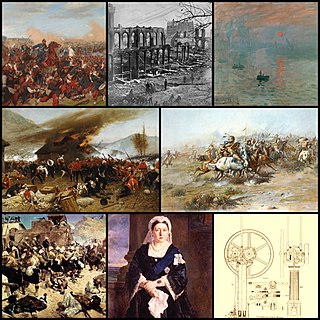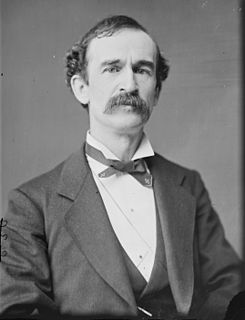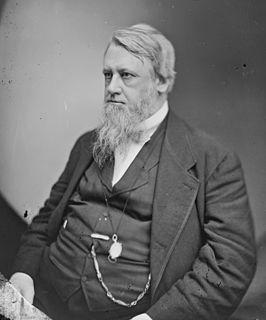Related Research Articles

The 1870s was a decade of the Gregorian calendar that began on January 1, 1870, and ended on December 31, 1879.

The 1872 United States presidential election was the 22nd quadrennial presidential election, held on Tuesday, November 5, 1872. Despite a split in the Republican Party, incumbent President Ulysses S. Grant defeated Democratic-endorsed Liberal Republican nominee Horace Greeley.

The Carlist Wars, a series of civil wars, took place in Spain during the 19th century. The contenders fought over claims to the throne, although some political differences also existed. Several times during the period from 1833 to 1876 the Carlists — followers of Don Carlos (1788-1855), an infante, and of his descendants — rallied to the cry of "God, Country, and King" and fought for the cause of Spanish tradition against liberalism, and later the republicanism, of the Spanish governments of the day. The Carlist Wars had a strong regional component, given that the new order called into question region–specific law arrangements and customs kept for centuries.

Louis-Antoine Garnier-Pagès was a French politician and active freemason who fought on the barricades during the revolution of July.

Benjamin Gratz Brown was an American politician. He was a U.S. Senator, the 20th Governor of Missouri, and the Liberal Republican and Democratic Party vice presidential candidate in the presidential election of 1872.

The 1872 and 1873 United States House of Representatives elections, coincided with the re-election of U.S. President Ulysses S. Grant.

James Herron Hopkins was a Democratic member of the U.S. House of Representatives representing the Pittsburgh area in Pennsylvania.
Members of the New South Wales Legislative Assembly who served in the seventh parliament of New South Wales held their seats from 1872 to 1874.</ref> The 182 election was held between 13 February and 28 March 1872 with parliament first meeting on 30 April 1872. There were 72 members elected for 52 single member electorates, 6 two member electorates and 2 four member electorates. The maximum term of this parliament was 3 years. However the assembly was dissolved after 32 months. Henry Parkes was the premier for the duration of the parliament. The Speaker was William Arnold.

The 1872 and 1873 United States Senate elections were elections which had the Republican Party, while still retaining a commanding majority, lose two seats in the United States Senate. By the beginning of the Congress, however, they'd lost three more: two as defections to the Liberal Republican Party, and one a resignation of Henry Wilson to become U.S. Vice President. These elections also coincided with President Ulysses S. Grant's easy re-election.
The 1872 Flint Boroughs by-election was fought on 16 October 1872. The byelection was fought due to the incumbent Liberal MP, Sir John Hanmer, being elevated to the peerage. It was won by the Liberal candidate Sir Robert Cunliffe, who was unopposed.
The 1872 Preston by-election was fought on 13 September 1872. The byelection was fought due to the death of one of the constituency's two Conservative MPs, Sir Thomas Fermor-Hesketh. It was won by the Conservative candidate John Holker.
The 1872 Pontefract by-election was fought on 15 August 1872. The ministerial by-election was fought due to the incumbent Liberal MP, Hugh Childers, becoming Chancellor of the Duchy of Lancaster and Paymaster General. It was retained by Childers.
The 1872 Aberdeen by-election was fought on 29 June 1872. The election occurred as a result of the death of the incumbent Liberal MP, William Henry Sykes. It was won by the "Moderate Liberal" candidate John Farley Leith against the official Liberal candidate James William Barclay, whose reputation as a Radical led to a split in the local party
The 1872 Mallow by-election was fought on 7 June 1872. The by-election was fought due to the resignation of the incumbent MP of the Liberal Party, George Waters, as he became Chairman of the Quarter Sessions of the County of Waterford. It was won by the Liberal candidate William Felix Munster.
The 1872 Oldham by-election was fought on 5 June 1872. The byelection was fought due to the death of the incumbent MP of the Liberal Party, John Platt. It was won by the Conservative candidate John Morgan Cobbett.
The 1872 Flintshire by-election was fought on 2 March 1872. The byelection was fought due to the incumbent MP of the Liberal Party, Lord Richard Grosvenor, becoming Vice-Chamberlain of the Household. It was won by the Liberal candidate Lord Richard Grosvenor, who was unopposed.
The 1872 Wick Burghs by-election was fought on 28 February 1872. The byelection was fought due to the Resignation of the incumbent MP of the Liberal Party, George Loch. It was won by the Liberal candidate John Pender.

The 1872 United States elections were held on November 5, electing the members of the 43rd United States Congress. The election took place during the Third Party System. The election took place during the Reconstruction Era, and many Southerners were barred from voting. Despite a split in the party, the Republicans retained control of the presidency and both houses of Congress.
The 1872 New South Wales colonial election was for 72 members representing 60 electoral districts. The election was conducted on the basis of a simple majority or first-past-the-post voting system. In this election there were 8 multi-member districts returning 20 members and 52 single member districts. In the multi-member districts each elector could vote for as many candidates as there were vacancies. 12 districts were uncontested.